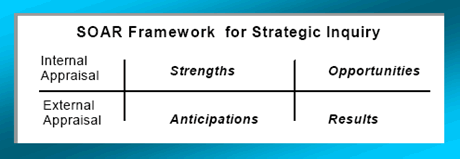
5 Principles of Appreciative Inquiry
The Appreciative Eye
 |
Creativity starts with an ‘appreciative’ eye. “Beauty is in the eye of the beholder”
“Leaders make sure people not only see the vision, they live and breath it.” Jack Welch, former CEO of G.E. and Author of ” Winning”.
Of course this is best done following Ghand’s advice: ‘Be the change you want to see happen’. |
 |
A very brief outline and discussion of the 5 Principles:
1. Constructionist Principle
Social Constructionism argues that the language and metaphors we use don’t just describe reality (the world), they actually create ‘our’ reality (the world). This is the reason great care is taken with the choice of language – as it will influence the kind of future we create.
The way we know (think/feel) influences our attitude and response. This principle suggests that we construct (make) meaning rather than extract it.
Just as different people will read the same book or article as others and come up with a different meaning so we can “read” an organisation differently. And just as we can come to a revised, refined or different meaning after discussing a book at a book club so we can and in fact do come to a “socially constructed” meaning about all manner of ‘things’ including organisations.
Given that we see and interpret the world (reality) through and with all sorts of filters and influences that are not always conscious or even known, we are, in my view, in fact ‘socially constructing’ the reality ‘out there’. So why not, consciously, look for the “good stuff”?
HOPE – Hearing other people’s experience.
The enlivening and liberating quality we call ‘hope’ (a real possibility) is liberated by sharing the “good stuff” such as our success stories.
Appreciation involves some blend of thankfulness, admiration, approval, and gratitude.It can also mean recognition of viewpoint or value to another.
In the financial world, something that “appreciates” grows in value.
With the power tool of appreciation, we get the benefit of these different perspectives: as we learn to be consistently thankful and approving, our life will grow in value. It is said that; “the way we know is fateful”. So why not seek to know, to inquire, to ask appreciative questions?
2. Principle of Simultaneity
The moment we begin to inquire into something change begins to happen. There are no neutral questions or comments. Inquiry and change – for all intents and purposes – are simultaneous events.
We have a choice and our choice will influence the outcome.
An interesting and useful question that demonstrates this principle is:
What was the best thing that has happened to you in the last week (or at work/school)?
In my experience this question (even, or especially, with children) leads to a genuinely interesting and ‘productive’ discussion.
The heart of AI is the unconditional positive question. Once asked that question becomes, as it were, the seed from which change will emerge.
3. The Poetic Principle
Just as a poem expresses a variety and different meanings so can people and events.
Looked at appreciatively any situation can ‘reveal’ useful foundations on which the desired future can be built.
What we focus on grows.
“At my best” stories bring out qualities that had previously not been realised.
In choosing the topic for an (AI) inquiry or investigation (interpretation) we are, in effect, helping to write the next chapter in the life of that organisation.
4. The Anticipatory Principle
Expectations impact the direction of action and attitudes. A simple reflection on our personal lives can validate this proposition. If I expect the function to be boring – often, it is so!
Our vision of the future has a very deep and profound influence on the way we act in the present. In fact it is thought that we sort of grow into the images we create.Hence if we are out to achieve deep or profound change we need to spend some time crafting or creating appropriate visions of the future.
The anticipation (or vision) being referred to in this context is born out of hope based on some actual realisations or experiences. It is not a flight of fantasy. It is brought into being with the exercise of our imagination, our most (in the view of Einstein) powerful ability.
In the organisational context we engage the ‘whole system’ to check for beliefs, hopes and aspirations that are or may be relevant to the group or organisational anticipation.
5. The Positive Principle
Things like hope, excitement, inspiration, caring, camaraderie, sense of urgent purpose and sheer joy in creating something meaningful together are all essentially, what we mean by being positive. This is why it is suggested that a lot of work needs to be done to ensure that the question being asked, the direction of the inquiry is affirmative and positive. Positive images lead to positive actions.
Hence we ask questions such as what gives life to this organisation or in the vernacular: “what creates the buzz or turns people on?”
Our being, our relationships and our organisations are affected by these principles.
